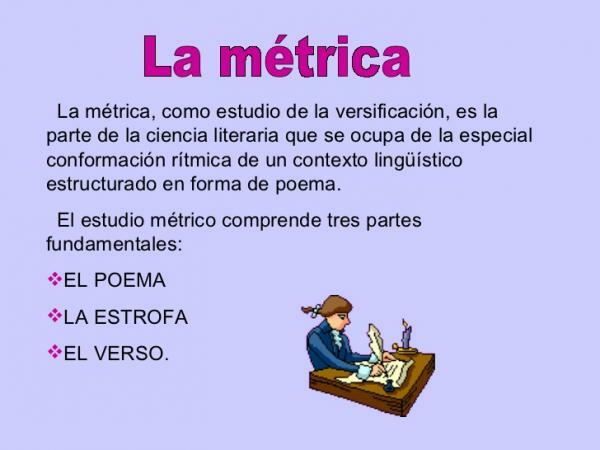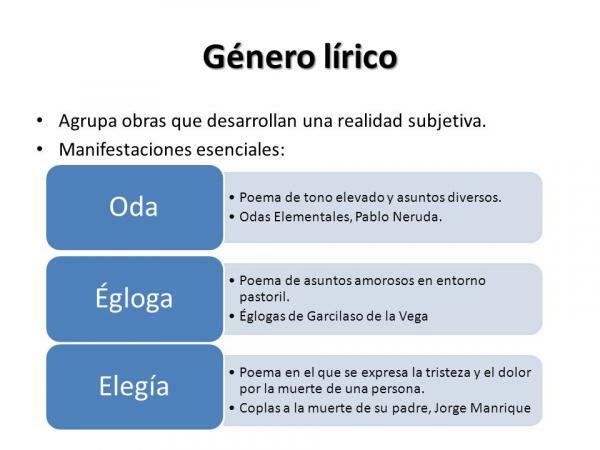LYRICAL genre: main characteristics

Image: Slideshare
The lyrical genre is a genre that has very different characteristics from other genres such as narrative, journalistic, and so on. Each textual typology has a series of elements that make them unique and communicate in a specific way. Poetry is a type of text that takes advantage of the literary resources that the language has and that, above all, is based on a subjective reading of life, of nature, of feelings, and so on. In this lesson from a TEACHER we are going to show you the characteristics of the lyrical genre that will help you to better understand the peculiarities that make up this type of text that is so popular and that manages to connect with the most dreamlike side of existence.
Index
- Brief introduction to the lyrical genre
- Subjectivity, one of the characteristics of the lyrical genre
- Figurative language, another of the most prominent elements of the lyrical genre
- The lyric is not a narrative voice
- The meter, another of the characteristics of the lyrical genre
- Other outstanding characteristics of the lyrical genre
- Types of composition of the lyrical genre
Brief introduction to the lyrical genre.
Before entering fully into the characteristics of the lyrical genre, it is important that we understand well what we mean when we talk about the lyrical. It is a kind of literary textthat is cultivated to be able express emotions of the poet, as well as his most intimate reflections and his perspective on life. Therefore, we are faced with a type of text that is subjective and that, therefore, is disassociated from other genres such as essays, scientific, journalistic, etc.
In addition to this subjective will, the lyrical genre also takes advantage of the communicative and expressive language to give it a more aesthetic meaning and a sonority and style worked. For this reason, poets often use the literary resources that we have in our language and that allow us to communicate in a very particular way and with a great personality.
It is a genre that is very closely linked to other aspects of language that other genres do not take into account: rhythm, harmony, the melody created with words, and so on. Therefore, it is a language loaded with musicality and with a very well fixed structure in which there are rhymes, stanzas, verses and one metrics well worked.

Image: Tes
Subjectivity, one of the characteristics of the lyrical genre.
But let's go fully into the characteristics of the lyrical genre and, for this, we will talk about one of the most outstanding elements of this literary text: subjectivity. As we have already anticipated in the previous section, the lyric is a genre that is immersed within the poet, therefore, it is a subjective text where we can attend the interpretation that the "poetic self" wants to give us of the lifetime. In these texts we find feelings, emotions, ideologies, experiences, ideas, etc., which are part of the intimate and inner life of the creator.
The poet can express himself in both the first and third person, depending on the style of the poem that he wants to elaborate. However, they have been detected three types of attitudes within the lyrical genre. They are as follows:
- Declarative attitude: It is when the poem has the objective of narrating something or describing a fact that can be both external and internal. This description will always be emotional and will use poetic language to be able to communicate through feelings.
- Apotrophic: is when the poet communicates with an entity during the poetic text. It is the kind of traditional attitude that the poet adopts in song (psalms or hymns).
- Song: is the lyrical genre by definition. It is when the poet takes advantage of the meter, the rhymes and the verses to create a song that expresses his feelings or his ideas.
Figurative language, another of the most prominent elements of the lyrical genre.
Another of the most outstanding characteristics of the lyrical genre is that in this type of text the poet always uses a very worked language and loaded with connotations. Therefore, he gives a rhetorical use to language in order to express his thoughts and emotions in a much more aesthetic way and with a greater effect on the reader. To achieve this goal, the poet take advantage of literary resources that will help you to configure a much more aesthetic poem.
Some of the literary resources most used by poets are the following:
- Alliteration: very followed by Rubén Darió, it is the resource that repeats the same sound in the same verse to give it more musicality
- Anaphora: it is the repetition of one or more words at the beginning of each verse
- Comparison: it is when different very disparate elements are compared to each other to create a poetic equality between them
- Metaphor: is to give an element a characteristic that it does not contain by comparing it with another element (The stars: the eyes of the night)
That the lyrical genre takes advantage of these resources of the language is what makes the meaning of these texts can be interpreted in many ways. And it is that in these cases the reader becomes an "interpreter" of the world of the poet and the result is that a poetry can end up being many poems at the same time. Something magic.
Image source: YouTube
The lyric is not a narrative voice.
Another element of the lyrical genre that is worth highlighting is that it is a type of text that is NOT narrative. What do we mean by this? Well, the objective of these texts is not to tell us a story, introduce ourselves to a character, tell us something... No. It is not a narrative text, it does not seek to explain anything that has a beginning and an end. What this type of genre intends is to communicate an idea, an emotion, make us evoke a beautiful landscape, make us shudder with a feeling, etc.
Therefore, the objective is that the reader experiences some emotion, either positive or negative, the objective is engage the reader in the experience and not let it be merely a reader oblivious to what happens in the text. The text is something of both: the poet and the reader who also becomes an essential part of the experience and that, with its interpretation and its feelings, it will be part of the poetry in the first person.
But even if it is not something narrative, it is clear that poetry usually wants to communicate something to us: an idea, a message, an image... However, the objective (as we have already said) is not to explain some facts or events to ourselves, but rather that we let's live the poetry directly in our meats..
The meter, another of the characteristics of the lyrical genre.
A very important element of poetry is the meter, that is, the rhythmic structure by which the literary text is configured. In fact, having a good meter is essential to be able to create a good lyrical text that achieves the intonation, rhythm and melody that you are looking for.
There are many ways to make the metric of a poema, however, one of the most abundant in Spanish is counting the syllables that is in each verse. In this way, we find poems that have these structures:
- Octosyllable: when the verses are 8 syllables. It is the typical structure of romances.
- Endecasyllables: it is the metric that has 11 syllables in each verse.
- Alexandrine: are the verses with 14 syllables and that, sometimes, are separated into 2 stanzas of 7 syllables

Image: Slideshare
Other outstanding characteristics of the lyrical genre.
And we finish this lesson on the characteristics of the lyric genre to collect other elements that make this type of text unique and can easily be differentiated from the rest. Here we offer you a list of the most outstanding elements:
- Theme: the theme of the lyric can be many and varied but, above all, they focus on internal experiences that have to do with the intimate life of the poet. You can talk about war, yes, but it will always be talked about from a subjective perspective and offering a vision that passes the filter of the poet's opinions and emotions.
- Defined rhythm: the rhythm of the poem is essential to be able to create a good lyrical text. The harmony of the text is just as important as the content, the language and the emotions it conveys. In order to create this rhythm, poets have different rhyme classes
- Understanding difficulty: For many students, understanding the lyric is an arduous task. As we have already commented, it is a type of genre that does not have a clear and concise message, but is at all times a personal interpretation of reality and emotions. Therefore, the reader becomes a confidant of the poet and, in addition, can interpret the message in many ways
Types of composition of the lyrical genre.
We end up talking about the different types of lyrical texts that we can find in the history of literature. Not only must we keep in mind romantic poetry or contemporary poetic verses, but there are many types of texts that are lyrical and that you should know. Here we discover them:
- Eclogue: it is a type of text originating in the Renaissance and introduces us to shepherds and bucolic environments who tell us about their loves and their emotions
- Elegy: it is a type of lyrical text that talks about the death of a loved one
- Ode: it can deal with many and very diverse topics and is usually a very long poem
- Pastorela: it is a type of genre in which the poet presents himself as a gentleman and uses a joking and sarcastic tone to talk about his position in society
- Romance: it is a composition that has different eight-syllable verses and where the rhyme is found in the even verses
- Sonnet: Originally from Italy, it is a type of composition that has verses of 11 syllables and that is typical of classical poetry
- Christmas carols: it is a type of lyrical composition that talks about biblical events typical of Catholic Christmas

Image: The vices of language
If you want to read more articles similar to Lyric genre: characteristics, we recommend that you enter our category of Literary concepts.

